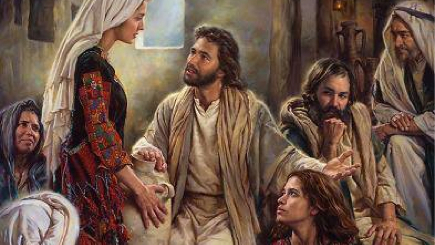As I was studying about Martha and Mary last night, I ran across the writings of St. Bernard. Though he was talking about Monastic life, he breaks down the three as symbols for three types of actions in our lives. They were friends of Jesus but also a family with Him. Brother and sisters. Here’s what he had to say:
Martha is representative of the everyday needs that must be met. These actions are the pragmatic and practical things that need to be finished for life to keep going. Whether that be our job, balancing the budget, shopping, or cleaning up after the family. She represents the active, busy, bustling highway of life that keeps the home economy running.
Mary represents the prayer and contemplation that must exist in our lives. Prayer is part of our intimate relationship with Jesus. Communication with our spouse, our lover, our Lord, and God. Starting with the Mass as the most important, but also adding in devotions like the Liturgy of the Hours, the rosary, adoration, or even just “wasting some time with Jesus.” One theologian once called prayer a “long, loving look at the real.” Mary reminds us this is integral to our Christian life.
Lazarus represents the hard labor and penance necessary to combat our sinful inclinations and work to become the person Jesus calls us to be. Unfortunately, this is part of the Christian life that is least popular but no less important. The word fasting often gets pushed to the side, swept under the rug. There are many ways to fast, to do penance, to build discipline that we might turn from sin and toward Holiness. Not all of them involve food.
All of this seems to point to something we often only talk about during Lent, the three pillars: prayer, fasting, and almsgiving. These aren’t supposed to be things we do just during Lent, but habits we cultivate in our lives to continue throughout the year. We should be continually living our lives with fiscal responsibility, remembering that supporting the Church is one of the precepts of the faith, and giving to the poor and needy is crucial to our Christian lives. We must be Martha when it comes to this because only when our house is in order can we properly control the gifts God has given us to share with others in almsgiving.
Fasting is part of that same family, in that when we choose to give up something to grow closer to God, we can use the money or time saved in that simple sacrifice to serve others or hand over to the fund for the poor. We at times must be Lazarus, dying to our own needs and wants to allow Jesus to resurrect us, so we might begin to live the life He has waiting for us here and now. It’s not just about getting to Heaven after this life, but about experiencing the life-giving power of Jesus Christ here and now.
Lastly, we come to the third pillar of our journey, prayer. Not the least important, as Jesus said, Mary has chosen the better part. Remember that prayer doesn’t replace or subvert the other two; it’s a part of the same family. Mary is supported by our actions as Martha, our fasting as Lazarus because both of those should begin and end with prayer. Prayer is how we should start our day and end it, speaking with Jesus throughout our lives—praying at all times without ceasing. Together they form a family, a home, a place where Jesus is welcome. A place where we are unafraid to come to Jesus with our sorrow, our joys, and our even our complaints. Even when we feel we have nothing to say, we can place ourselves in the loving arms of Jesus and trust that His will is to give us grace and joy beyond anything we can imagine.
Rather than compete with one another, they cooperated and lived in harmony. Such is the view that Saint Bernard formed to create a home where the Savior could find the welcome that only love and faith can provide. As we commemorate these holy sisters and their brother today, let us learn to imitate their unity of heart and faith. May this Eucharist bestow on each of us here the grace to make our community a place where Jesus, the Life-Giver, is always welcomed with the faith and love that unites us to the Father in that life knows no end.
Memorial of Saints Martha, Mary, and Lazarus
Lectionary: 404/607
Ex 40:16-21, 34-38; Psalm 84:3, 4, 5-6a and 8a, 11; Jn 11:19-27 or Lk 10:38-42

